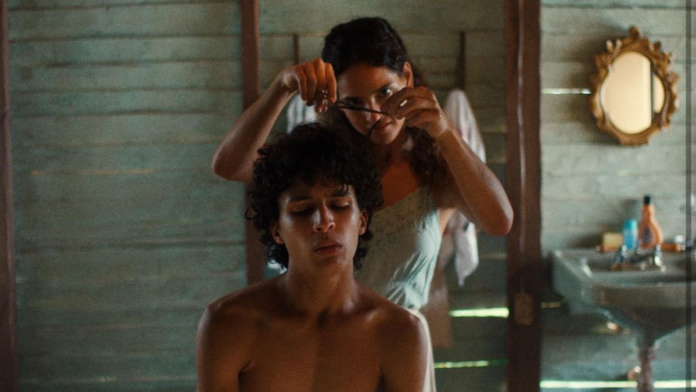Set during the Special Period in the 1990s, where Cuba lost both military and economic support due to the collapse of the Soviet Union, Los Frikis follows brothers Gustavo (Eros de la Puente) and Paco (Héctor Medina). It’s a dire situation in Cuba; people are starving and eating whatever living they can get their hands on (cat lovers should avert their eyes at this point), and building rafts to try and make their way to America to improve their lives in some way. Paco – the brother always getting into fights and problematic situations – isn’t invited by their uncle to join their raft, so he takes things into his own hands and injects himself with HIV-infected blood in order to be sent to a sanitarium.
The sanitarium will have everything they’re lacking on the outside: food, board, and access to rock music. The hope is that there will be a cure for AIDs while they wait out the tough economic situation, but as we know, no cure would be available, and many of them would die tragically. Maybe it’s the fear of change that has Gustavo leaping into the water and swimming back to Cuba to be with his brother, after all, Paco is the only family he has left and leaving him behind to suffer a terrible fate on his own is more than he can bear.
The visuals in the film are lush and vibrant, and depict the joys of the community in the sanitarium. The outcasts make a wonderful life for themselves and by doing so, stick it to the man who has limited their freedoms and autonomy. The sanitarium is self-managed by the sick and those who care for them. One such caretaker is Maria (Adria Arjona), who came to the sanitarium to care for her brother Lucas, but continues to stay even after he’s passed. Arjona was brilliant in Hit Man so I had high expectations for her role here, but she is more or less reduced to a love interest and a means for Gustavo’s sexual awakening.
The filmmakers, who previously helmed The Peanut Butter Falcon, employs the same means of filmmaking here in Los Frikis, which feels tonally imbalanced given the bleak period and conditions the film is set in. The first half is this sweet coming of age film, centred on Gustavo, who is merely pretending to be HIV positive, while the angry, rebellious Paco exists more in the peripheries of the film. It’s a misplaced opportunity not to focus more on him, especially given how scene stealing Medina is. Paco – much like the fiery stallion Ringo Gustavo cares for – is the embodiment of the rebel energy Castro wants outlawed; he revels in anarchy and has no qualms speaking truth to power despite the consequences. Even the minor character Maximo (Jorge Enrique Caballero) – who’s only in a handful of scenes – captured my attention more than whatever was going on with Gustavo.
As much as de la Puente tries to make Gustavo more than just a vessel for his brother’s story, it’s hard to flesh out a character that feels too much of a blank slate. Through his relationship with Paco and Maria, Gustavo grows to understand the phases of life that govern existence: there is life, death and the highs and lows of the in-between. Stasis isn’t permanent; people change, people leave, and we adapt the best we can.
Los Frikis is an important story, and it’s laudable that directors Tyler Nilson and Michael Schwartz are choosing to focus on underrepresented stories, I just wish they focused the narrative more on a protagonist who was truly a part of the picture.
Review screener provided.
REVIEW SCORE: 3/5

